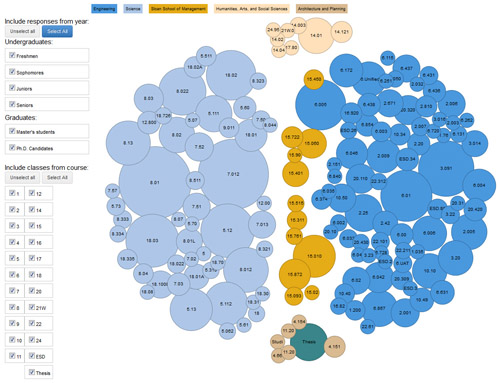Student's 'Meltdown' Generates Stress Survey, Important Discussion
-
-
slice.mit.edu
- 4
Filed Under
Recommended
 Admissions blogger Lydia A. Krasilnikova ’14, whose Oct. 29 blog post “Meltdown” was covered by NPR's Boston branch and sparked a campus-wide discussion of stress at MIT. Two weeks following the post, walk-in visits to Student Support Services had tripled over the previous year. Read an interview with her
Admissions blogger Lydia A. Krasilnikova ’14, whose Oct. 29 blog post “Meltdown” was covered by NPR's Boston branch and sparked a campus-wide discussion of stress at MIT. Two weeks following the post, walk-in visits to Student Support Services had tripled over the previous year. Read an interview with her
Recently, the Tech surveyed the student body about stress, and 3,191—about 29% of all students (35% of undergrads)—responded. The result is Under Pressure, a feature containing compelling—and interactive—infographics (you can filter results by a number of variables) as well as a list of supporting multimedia, such as videos, letters to the editor, a talk with the director of mental health at the Institute, profiles of student support groups, playlists for de-stressing, and more. A few of the survey results are highlighted below.
According to the editor's note to Under Pressure, 52% of students have, at one point, felt like they don’t belong at the Institute. There's a nice interview with Dean of Admissions Stu Schmill '86 assuring students their admission to MIT was not a fluke.
The work that went into Under Pressure is impressive as is the MIT community's support of this important topic. The Tech and the chancellor’s office will cosponsor a forum for students during IAP to discuss issues surrounding pressure and stress at MIT, and the Institute recently launched MIT Together, a portal to support resources for students.

Under Pressure Snapshot Just a few of the findings are below, but you have to check out the interactive graphics, which break down stress by dorm, year, major, gender, and age; reveal how students split their time among sleep, work, and play as well as when they sleep; and show the single most stressful class by year or major. For freshmen, it's 8.01 (physics, classical mechanics) and 7.012 (introductory biology). Sound familiar?
- Grad students living in Edgerton House spend the most hours per week doing homework on average: 50.12.
- Among undergrad dorms, McCormick works the hardest with 33.71 hours.
- Residents of Next House spend the least amount of time on average, 23.04 hours.
- The happiest residence is Baker House.
- On average, students have four close friends.
- 4 (architecture)
- 17 (political science)
- 11 (urban studies and planning)
- 22 (nuclear science and engineering)
- 18 (mathematics)
- 24 (linguistics and philosophy)
- 15 (management)
- "I don’t feel good when I’m over-committed and over-worked, but I don’t feel good about myself if I’m not like that."
- "I don’t feel like I’m learning anymore. Instead, I feel like I’m living from p-set to p-set."
- "MIT has done a wonderful job of discouraging competition among peers, but has not done anything about competition with one’s self."
Alumni, add your voices. What advice do you have for stressed-out students?








Comments
Brian Neltner
Wed, 12/12/2012 1:05am
Be willing to say, "It's 2am, and I'm not done with this pset. This pset is not going to be finished, and I am okay with that. If I get a bad grade in my class because of it, so be it. I am here to learn, not get good grades, and if I don't sleep I won't learn well."
Find a way to get enough sleep. It makes everything better.
Former MITer
Fri, 12/21/2012 12:37pm
I agree with the comments by both Brian Nelter & Erik Trimble. As a former MIT grad student, I was willing to give up at 2AM. I did not have that perspective as an undergrad,nor did I want it. I think many current students feel the same way. Having relentless drive to work on problems that seem too hard is an extremely useful quality to have in life, and MIT should continue to encourage and foster it.
Gill Abrams
Mon, 12/17/2012 2:20pm
That's so true, Brian - it's almost all about getting enough sleep. Most students don't realize how crucial this is.
Great post Amy, thanks!
Erik Trimble
Wed, 12/12/2012 2:19am
As someone who actually dropped out of MIT, partially due to stress, I can say that now, when I look back, I don't fault the academic environment at all. The vast quantity of work and the rigorous challenges were indeed daunting, but, in my opinion, entirely warranted, and I think it would be a great disservice to MIT students to change the academics.
That said, MIT when I was there (early 90s) was a fundamentally cold place. Students who matriculate are generally the best and brightest from where they come. While most adapt quite well to the concept that they are no longer the top 1% of the class, it comes as much more of a shock to many (and I speak for myself and several of my closer friends there) that not only are they challenged sorely, but there are academics that, for the first time, are beyond their abilities to excel in. That is, many undergraduates are finally faced with their intellectual limits - they simply *can't* excel at certain things, even if they work hard and apply themselves. For me, it was 8.02 and recognizing that I just can't really understand E&M physics. Others, it was 14.0[12] and not grokking economics. A couple of others, 18.03 and Diff Eq.
I think the biggest issue I faced, and one which I *know* is still a challenge for MIT, is to be able to reach out to students feeling stress. MIT needs not only world-class stress and social advisers (I don't like the word "therapist", but certainly someone with advanced training is required), it needs a culture where students are not only encouraged to ask for help, but are included in an environment where help is *offered* to them, regularly. Many students will never seek out the help they need, even if such help is clearly available (which, at my time at MIT, was NOT well-advertised). Rather, what is needed is advisers, tutors, TAs, and even upperclass students willing to say "You looked stressed. How about we go see so you can get some help reducing it." Why is it that so many students form self-help groups to work on problem sets, yet none of them think to consider outside help for things NOT of an academic nature?
It's about creating a culture which doesn't coddle the workload, but which also helps students recognize their limits and helps them deal with the consequences of those limits. It's about realizing that we're NOT Supermen (or Superwomen), even with all our abilities, that asking for help is NOT failure, getting help is a normal part of any human being's life, and that other people are both able to help and are available to help. Frankly, the average MIT student isn't the most well-socialized example of humanity, and it is this lack of socialization - and a community which somewhat indifferent to its importance - which frequently leads to the destructive ends that stress overload can have.